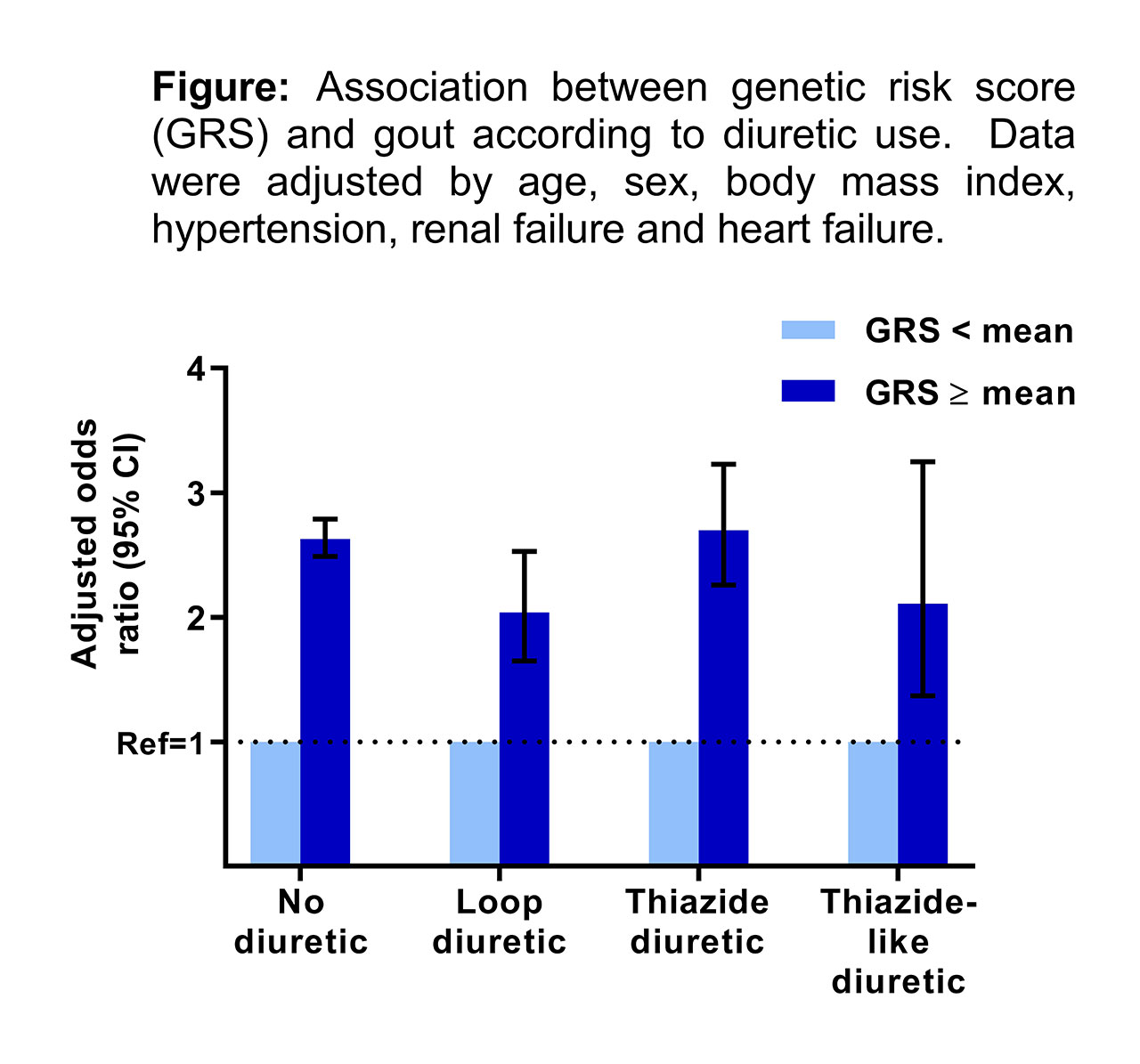Session Information
Date: Monday, November 11, 2019
Title: Metabolic & Crystal Arthropathies Poster II: Clinical Trials & Basic Science
Session Type: Poster Session (Monday)
Session Time: 9:00AM-11:00AM
Background/Purpose: Genome-wide association studies have identified single nucleotide polymorphisms (SNPs) associated with serum urate and gout. An association between diuretic use and gout has also been reported by many investigators. The aim of this study was to examine whether serum urate-associated genetic variants differ in their influence on gout risk in people taking a diuretic compared to those not taking a diuretic, and to test for interactions between these genetic variants and diuretic use for gout association.
Methods: This research was conducted using the UK Biobank Resource. Participants of European ethnicity, aged 40-69 years, and with genome-wide genotypes were included. Gout was defined using a validated definition (self-report of gout or urate-lowering therapy use). Medication use (including diuretics) and co-morbidity data were collected via self-report. The 10 serum urate-associated SNPs with the strongest association for gout as reported by Cadzow et al (Arthritis Res Ther 2017) were tested for their association with gout according to diuretic use. Gene-diuretic interactions for gout association were tested using a genetic risk score (GRS) and individual SNPs by logistic regression adjusting for age, sex, body mass index, kidney failure, heart failure and hypertension.
Results: Data were available for 359,876 participants, including 7,342 gout cases (2.0%). Gout was present in 1,197 (4.0%) diuretic users and 6,145 (1.9%) non-diuretic users; OR [95% CI] 2.21 [2.08-2.36] for diuretic users compared to non-diuretic users. After adjustment, use of a loop diuretic was positively associated with prevalent gout (OR 2.34 [2.08-2.63]), but thiazide diuretics were inversely associated with prevalent gout (OR 0.60 [0.55-0.66]). Compared with a lower GRS (below the mean), a higher GRS (mean or higher) was positively associated with gout in those not on diuretics (OR 2.63 [2.49-2.79]), in those on loop diuretics (OR 2.04 [1.65-2.53]), in those on thiazide diuretics (OR 2.70 [2.26-3.23]), and in those on thiazide-like diuretics (OR 2.11 [1.37-3.25]) with similar ORs and overlapping confidence intervals (Figure). The use of a loop diuretic with the presence of a higher GRS exerted the highest ORs for gout association; compared to non-diuretic users with a lower GRS, the OR for gout was 6.04 [5.18-7.04] in loop diuretic users with a higher GRS.
Conclusion: In people on diuretics, serum urate-associated genetic variants contribute strongly to gout risk, with a similar effect to that observed in those not taking a diuretic. These findings suggest that the contribution of genetic variants is not restricted to people with ‘primary’ gout and genetic variants play an important role in gout susceptibility in the presence of other risk factors.
To cite this abstract in AMA style:
Narang R, Gamble G, Phipps-Green A, Topless R, Cadzow M, Stamp L, Merriman T, Dalbeth N. Do Serum Urate-Associated Genetic Variants Influence Gout Risk in People on Diuretics? Analysis of the UK Biobank [abstract]. Arthritis Rheumatol. 2019; 71 (suppl 10). https://acrabstracts.org/abstract/do-serum-urate-associated-genetic-variants-influence-gout-risk-in-people-on-diuretics-analysis-of-the-uk-biobank/. Accessed .« Back to 2019 ACR/ARP Annual Meeting
ACR Meeting Abstracts - https://acrabstracts.org/abstract/do-serum-urate-associated-genetic-variants-influence-gout-risk-in-people-on-diuretics-analysis-of-the-uk-biobank/

